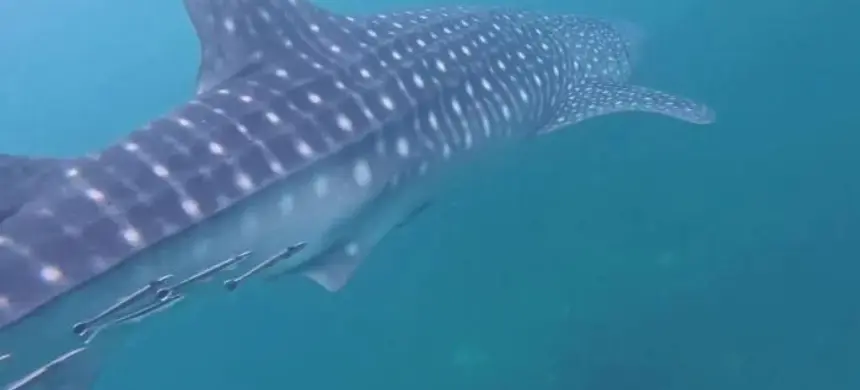The Pakistan Boat Rally and Fishing Association (PBRFA) has announced a rare sighting of an endangered whale shark this month by one of its members during a diving expedition at Charna Island in the Arabian Sea.
Whale sharks, the largest fish in the world, are known for their impressive size and gentle demeanor. The International Fund for Animal Welfare notes that these giant creatures inhabit warm tropical waters and typically swim near the surface in search of food. The largest recorded whale shark measured 19 meters in length and weighed over 15 tons. Despite their size, whale sharks feed by filtering small organisms through their gills as they swim with their mouths open, and they are known for their peaceful nature and curiosity towards humans.
Easily identifiable by their dark skin marked with light horizontal and vertical lines and numerous white spots, whale sharks are a sight to behold. During the diving trip at Charna Island, PBRFA members Manan Sheikh, Faazil Tapal, Rayan Maker, Arslan Khan, and Mikaeel Ali Habib had the rare opportunity to swim alongside this gentle giant for nearly 20 minutes. This encounter highlights the importance of marine conservation, given that there are only an estimated 150,000 whale sharks left worldwide.
Read More: Shark Tank Pakistan: Challenges and Opportunities in Bringing a Global Franchise
Charna Island, near Mubarak Goth in Kiamari Town, Karachi, features depths between 20 to 60 feet, providing a rich habitat for marine life. The area is frequented by whale sharks and whales, particularly during the winter or after the monsoon season when nutrient-rich minerals from the Hub River enrich the waters.
Whale sharks (Rhincodon typus) are classified as endangered on the IUCN Red List of Endangered Species, with their global population having declined by over 50% in the past 75 years due to threats such as fishing, marine pollution, finning, and climate change.
Much about whale sharks remains unknown due to their elusive nature and cartilage-based skeletons, which complicate efforts to study their behavior, lifespan, and reproduction.











